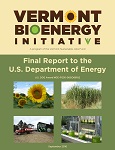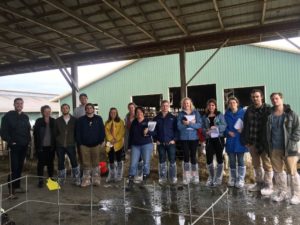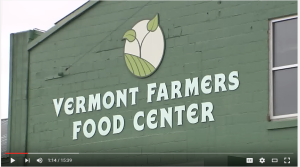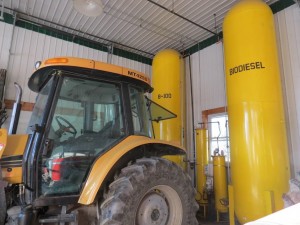 The purpose of the Vermont Bioenergy Initiative (VBI) was to foster the development of sustainable, distributed, small-scale biodiesel and grass/mixed fiber industries in Vermont in order to produce bioenergy for local transportation, agricultural, and thermal applications, as a replacement for fossil fuel based energy.
The purpose of the Vermont Bioenergy Initiative (VBI) was to foster the development of sustainable, distributed, small-scale biodiesel and grass/mixed fiber industries in Vermont in order to produce bioenergy for local transportation, agricultural, and thermal applications, as a replacement for fossil fuel based energy.
The VBI marked the first strategic effort to reduce Vermont’s dependency on petroleum through the development of homegrown alternatives. With billions of gallons of ethanol produced and blended with gasoline each year in the United States—and very little possibility of corn-based ethanol development in Vermont—we focused on a specific subset of bioenergy alternatives:
 We worked with interested farmers to develop on-farm oilseed production, processing, and biodiesel production capacity for farm and local community use, and with researchers to develop the agronomics and economics of oilseed crop and biodiesel production in Vermont.
We worked with interested farmers to develop on-farm oilseed production, processing, and biodiesel production capacity for farm and local community use, and with researchers to develop the agronomics and economics of oilseed crop and biodiesel production in Vermont.
 We worked with interested farmers, entrepreneurs, and researchers to augment Vermont’s woody biomass supply with grass and mixed fiber pellets for thermal applications.
We worked with interested farmers, entrepreneurs, and researchers to augment Vermont’s woody biomass supply with grass and mixed fiber pellets for thermal applications.
 We worked with interested researchers, entrepreneurs, and farmers to develop cold climate algae that could eventually be available for biodiesel production.
We worked with interested researchers, entrepreneurs, and farmers to develop cold climate algae that could eventually be available for biodiesel production.
We developed many tools for understanding Vermont’s bioenergy alternatives,
including:
► the Renewable Energy Atlas of Vermont (relaunched in 2016 as the Community
Energy Dashboard), a map-based website for visualizing existing and potential
renewable energy sites;
► an Oilseed and Biodiesel Production Calculator (downloaded more than 200
times from people in the U.S. and around the world);
► a nine-part video series, Bioenergy Now!— collectively viewed over 89,000
times—that highlights oilseed crop and biodiesel production, grass energy
production, and algae research;
► the VBI website, a repository for all materials developed by the Initiative; and
► content for biomass-to-bioenergy courses offered at the University of Vermont
and Vermont Technical College.
At the beginning of this project, Vermont had very limited experience with the research, feedstocks, production processes, industry networks, and many other factors necessary to develop biodiesel and grass/mixed fiber pellet industries. Our investments in feasibility analyses, research and development, technology and demonstration projects, and education and outreach resources for various bioenergy feedstocks have created a solid foundation for future efforts to build from.
 In 2012, the Vermont Legislature unanimously passed Act 148, a universal recycling and composting law that offers Vermonters a new set of systems and tools for keeping organic matter out of the landfill. Repurposes waste not being converted into compost, fertilizer, or other value products are all resources that hold potential energy that can be developed in a sustainable way to power a local economy. The University of Vermont is offering two bioenergy courses for the Fall 2016 Semester: Biomass to Biofuels – Bioenergy & Byproducts and Universal Recycling Law – Vermont Act 148 Community Connections
In 2012, the Vermont Legislature unanimously passed Act 148, a universal recycling and composting law that offers Vermonters a new set of systems and tools for keeping organic matter out of the landfill. Repurposes waste not being converted into compost, fertilizer, or other value products are all resources that hold potential energy that can be developed in a sustainable way to power a local economy. The University of Vermont is offering two bioenergy courses for the Fall 2016 Semester: Biomass to Biofuels – Bioenergy & Byproducts and Universal Recycling Law – Vermont Act 148 Community Connections
Universal Recycling Law – Vermont Act 148 Community Connections will explore community development connections for the creation of energy and valued products from universal recycling of organic materials. It will provide a broad appreciation of the technical, economical, political and environmental challenges with universal recycling. Biomass to Biofuels – Bioenergy & Byproducts will explore the sustainable and responsible production for small to community scales of bioenergy. An online Bioenergy Professional Certificate course is also being offered during Summer 2016. The course will focus on clean, sustainable bioenergy such as, bioelectricity and biogas production from dairy manure and food waste streams. This eight-week course is comprised of seven sub courses, ranging from bioenergy technologies to bioenergy related economics, environmental and social issues
All of the courses will be taught by Anju Krivov, cofounder of General Systems Research, lead biofuels instructor at UVM’s Rubenstein School of Environment and Natural Resources and a Vermont Bioenergy Initiative algae for biofuel grant recipient. They will focus on the sustainable and diverse sources of energy that can be used to create a resilient bioenergy industry.
For more information about these courses visit the course website or email anju.krivov@uvm.edu. Register online or contact the Registrar’s Office.
 UVM Extension and the Vermont Bioenergy Initiative supported the installation of a multi-source biomass fuel boiler at the Vermont Farmers Food Center in Rutland, Vermont. The boiler uses several alternative fuels, such as wood pellets and grass biomass pucks, to displace propane and heat the 4,200 square foot space, home to the Rutland Winter Farmers’ Market and a variety of food system educational program and events. The biomass project demonstrates the economic advantages when compared to typical propane heaters, including a much smaller payback period (roughly 2-8 years) when using biomass fuel sources. Chris Callahan, a UVM Extension Agricultural Engineer, directed the project and worked closely with the Vermont Farmers Food Center to fit a biomass fuel boiler for the space specifications.
UVM Extension and the Vermont Bioenergy Initiative supported the installation of a multi-source biomass fuel boiler at the Vermont Farmers Food Center in Rutland, Vermont. The boiler uses several alternative fuels, such as wood pellets and grass biomass pucks, to displace propane and heat the 4,200 square foot space, home to the Rutland Winter Farmers’ Market and a variety of food system educational program and events. The biomass project demonstrates the economic advantages when compared to typical propane heaters, including a much smaller payback period (roughly 2-8 years) when using biomass fuel sources. Chris Callahan, a UVM Extension Agricultural Engineer, directed the project and worked closely with the Vermont Farmers Food Center to fit a biomass fuel boiler for the space specifications.
Check out this video featuring the project on Across the Fence, the longest-running locally-produced program in the US:
21 Mar 2016
Vermont biodiesel success for Bourne’s Energy

Bourne’s Energy delivers Vermont biodiesel to customers.
Bourne’s Energy began to incorporate blended Vermont biodiesel into their fuel business in 2013, due in part to a grant from the Vermont Bioenergy Initiative paying for a facility to produce blended biodiesel. Since then the company has been able to replace over 300,000 gallons of fossil fuel with biodiesel. Bourne’s flagship B15 Biodiesel blend, dubbed “Bioheat®” for customer home heating needs, is a benefit to all aspects of the business—both financially and environmentally, not to mention positive to their growing sustainability image. Additionally, the company has been able to run their fleet from April to November on biodiesel, as well as operate pumps in Morrisville, Hardwick, Lyndonville and Montpelier that offer customers on/off road diesel or biodiesel.
“It’s been a success in every way to this point, and we’ve always had the privilege of a good product,” Peter Bourne stated referring to the biofuel coming from White Mountain Biodiesel in New Hampshire. The oil that White Mountain Biodiesel produces is from recycled cooking oil, an important attribute for Bourne’s Energy. Sustainable biodiesel is valued by Vermonters and fits into the local production for local use model promoted by the Vermont Bioenergy Initiative while avoiding controversies that arise from the food versus fuel debate.
Customers and local residents alike provided vastly positive feedback when Bourne’s began incorporating biodiesel into the mix and better yet, customers found the Bioheat® fuel blend to be quiet with no disruption in performance. Biodiesel is just “part of business as usual now,” Bourne concludes.
A long-time Bourne’s Energy customer noted, “I heat my home with oil and never thought much about it until my granddaughter helped me pay my bill online and saw that I was being delivered Bioheat®. I thought, ‘What the heck am I getting?’ I read all about it and found it allowed me to reduce my carbon footprint without doing a thing! It’s got me on the right track for doing what I can for cleaner air, our environment and a whole long list of things.”
In addition to the biodiesel-blended fuel, Bourne’s is expanding their bioenergy product line by further developing the infrastructure for their four year old bulk pellets program. Bourne’s sources quality pellets locally in Vermont and when demand exceeds supply, they source from New Hampshire, but choose not to go further for both economic and environmental reasons.
“We are a company really trying to reduce people’s consumption by supplying the right product at the right time. We can show it, we mean it, we’re doing it, and we’re not just flash,” Bourne shared in a recent conversation. The success and integrity of Bourne’s Vermont biodiesel work backs this claim, and positions Bourne’s Energy as a meaningful contributor to the development of Vermont Climate Economy.
26 Feb 2016
New Resource for Farmers: A Legal and Regulatory Overview of On-Farm Biodiesel Production in Vermont

State Line Farm in Shaftsbury, Vermont is an innovative bioenergy farm and research facility and worked with Institute for Energy and the Environment at Vermont Law School researchers on the On-Farm Biodiesel Production in Vermont: Legal and Regulatory Overview report.
A new report, On-Farm Biodiesel Production in Vermont: Legal and Regulatory Overview, conducted by the Institute for Energy and the Environment (IEE) at Vermont Law School reviews all Vermont state and federal regulations related to on-farm biodiesel production. Commissioned by the Vermont Bioenergy Initiative at the Vermont Sustainable Jobs Fund, the report aims to inform farmers about the potential laws and regulations surrounding on-farm biodiesel production.
“As statewide partners begin to find new ways to achieve the goals of Vermont’s Comprehensive Energy Plan, which identified biodiesel as a fuel that will help Vermont meet the 10-percent renewable transportation goal for 2025, the On-Farm Biodiesel Production in Vermont report provides a timely review of the regulations that pertain to home-grown biodiesel production,” states Ellen Kahler, executive director of the Vermont Sustainable Jobs Fund.
According to the report’s findings, “while several of the federal regulations are only triggered by high levels of production, there are a number of state laws and regulations that may be triggered by small-scale biodiesel production, such as state air emission provisions that establish lower thresholds when compared to the federal Clean Air Act (CAA). In addition, it is critical to understand the role biodiesel production plays in the definition of ‘farm’ and ‘farming activities’ for the purpose of states laws, such as Act 250 and the Current Use Program.”
IEE Global Energy Fellow Carla Santos coordinated the legal review with contributions from fellow IEE researchers Diana Chace, Christopher Cavaiola, Jeannie Oliver, and Jeremy Walker. The report is broken into five chapters that review tax legislation, site regulations, occupational safety and health, registration, and environmental legislation.
“Our institute’s research should help Vermont farmers understand the regulatory hurdles to producing biodiesel on the farm and help them convert a locally grown resource into economic and environmental benefits for Vermont,” said VLS Professor Kevin B. Jones, deputy director of the Institute for Energy and the Environment.
IEE researchers applied the legal review to three potential scenarios in the report, concluding with a convenient and accessible list of “do’s and don’ts” for farmers to use as a legal checklist as they move forward with producing biofuel in on-farm operations.
The complete On-Farm Biodiesel Production in Vermont: Legal and Regulatory Overview report is available on the Vermont Bioenergy Initiative website along with a variety of additional biofuel relevant reports and resources.
###
Since 2005, the Vermont Bioenergy Initiative has connected diversified agriculture and local renewable energy production for on-farm and community use by supporting research, technical assistance, and infrastructure development in emerging areas of bioenergy including biodiesel production and distribution for heating and transportation, oil crops for on-farm biodiesel and feed, grass for heating, and algae production for biofuels and wastewater management. The Vermont Bioenergy Initiative is a program of the Vermont Sustainable Jobs Fund, a non-profit organization created by the State of Vermont to help develop Vermont’s sustainable agriculture, renewable energy, and forest product businesses. For more information about the Vermont Bioenergy Initiative, visit www.VermontBioenergy.com.
The Institute for Energy and the Environment at Vermont Law School provides accessible resources on contemporary energy law and policy and is modeled on the fundamentals of a successful public policy consulting firm. The IEE distributes scholarly, technical, and practical publications; provides forums and conferences for professional education and issue development; and serves as a center for graduate research on energy issues, with environmental awareness. IEE research associates are selected from students in the energy and environmental programs at Vermont Law School, top-ranked in the nation for environmental law. For more information about the Institute for Energy and the Environment, visit vermontlaw.edu/iee.
19 Feb 2016
Biomass Energy exploration at Northeast Biomass Heating Expo in Burlington, Vermont March 30 – April 1

Northeast Biomass Heating Expo to be held in Burlington, Vermont March 30 – April 1
The 8th annual Northeast Biomass Heating Expo will be held March 30 – April 1 at the Sheraton Hotel and Conference Center in Burlington, Vermont. The Expo has become one of the fastest growing biomass thermal energy conferences in the United States, with almost 2,000 attendees expected this year. There will also be over 400 businesses, agencies and organizations present to contribute to the event’s comprehensive knowledge base of biomass thermal heating.
Biomass heating is a widely available source of renewable energy, which can help meet the heating needs of homes and businesses while displacing fossil fuels. The types of biomass most commonly used for energy include waste wood form the timber and wood products industries, as well as agriculture residues. These fuels can either be directly combusted, or they can undergo a variety of refining processes such as chipping or pelletization for use in a variety of home and industry heating applications.
Speakers, panel discussions, presentations, educational sessions and additional opportunities for tours and workshops will be available at this year’s expo. It is an excellent opportunity for networking with organizations, government, and across the broader biomass industry.
The Northeast Biomass Heating Expo is currently seeking co-hosts to help promote and be promoted at the event. Non-profit organizations, trade associations, community groups, and government agencies are all invited to become an event co-host. Co-host organization’s name and logo will be prominently displayed on conference communication outlets, and receive a free display tabletop at the event to share information with attendees. They will also be recognized during the opening and closing events and receive a special extension of the ‘Early Bird’ rate by one month.
Learn more about the Northeast Biomass Heating Expo at www.nebiomassheat.com.





